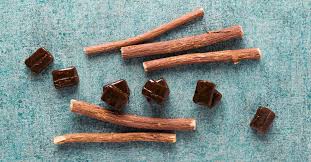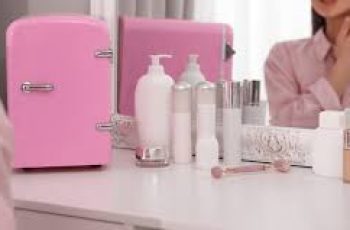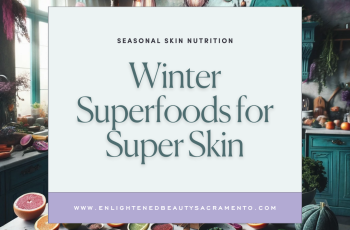
Licorice Extract in Skin Care
Licorice root extract is used in many skin care products for the face like moisturizers, anti-aging creams, and sunscreens.
It is a common natural ingredient found across the world and throughout history for its versatility in medicine, food, and cosmetics.
Licorice extract in skin care has many appreciable benefits and only a few potential side effects. It is great for controlling acne breakouts, moisturizing skin, and eliminating free radicals!
Find out if licorice extract is right for your Baumann Skin Type by taking the quiz for free below!
What is licorice extract?
Licorice extract (Glycyrrhiza glabra) is an oil pressed from the roots of a licorice plant.
It was used for medical and dietary purposes by ancient civilizations like the ancient Egyptians, Greeks, and Romans, the ancient Chinese Han Dynasty (300-200B.C.E) (2).
Today, licorice remains one of the most frequently used herbs in eastern holistic supplements and remedies.
Licorice root extract is an ancient, versatile, and popular ingredient in modern western skin care products as well.
Several species of licorice are used for their extracts in skin care today.
Closely related to common licorice root is (Glycyrrhiza inflata), the Chinese licorice root. they share pharmaceutical and dietary uses even though they are not the exact same species (3).
Glycyrrhiza echinata
What are the benefits of licorice root extract?
Licorice root extract has a variety of appreciable benefits used in skin care and in other kinds of products.
It is commonly used in moisturizers for its high concentration of beneficial moisturizing fatty acids.
Licorice root is anti-microbial, meaning it eliminates bacteria and can be used to extend shelf lives of skin care or food products.
Anti-microbials like LRE are also extremely useful in acne products.
It is also estrogenic, meaning it can be used in some hormone supplements to regulate various reproductive processes. (5)
There are active antioxidants in LRE as well, meaning it is good for conditions like sun damage and other forms of hyperpigmentation. (1)
It is a tyrosinase inhibitor, which means it slows melanin production and treats dark spots.
The anti-inflammatories in LRE are great for soothing inflammation, irritation, or mild allergic reactions on the skin. (5)
Is licorice root extract used in skin care?
Licorice root extract is a versatile compound that is very common and useful in skin care products.
Licorice root extract is used in a variety of skin care products like:
anti-aging serums
facial peels
moisturizers
skin lighteners
sunscreens
Take the questionnaire to shop by your skin type for the best licorice oils for you! Additionally, you can find some of my favorite licorice root extract products here:
Take the Quiz
is licorice root safe for use in skin care?
Safety
Licorice root extract is safe for use as long as you are not pregnant while using it. Glabridin, a compoent in licorice extract, has shown potential teratogenic effects in some studies, meaning it could cause developmental abnormalities in a fetus. This makes it a concern for use during pregnancy.
The EWG score for licorice root is “5” which is on the “Not safe” end of the 5 point scale. However, the only advisement is to avoid use during pregnancy. (There are forms of glabridin free licorice extract that can be used in pregnancy- but they are not as effective as a tyrosinase inhibitor)
An allergy to LRE is possible, but very rare.
At any other point, licorice root extract is completely safe for use and is often recommended in many skin care products.
Take the Quiz
Using licorice extract while pregnant
One study conducted in Finland showed that babies who were exposed to high amounts of ingested licorice in utero experienced a few developmental differences from a control group (17).
The children with high exposure to licorice grew to be taller, heavier, and started puberty sooner than the control.
It also appeared that the same group exposed to licorice exhibited worse memory and a higher tendency for mild learning disability (17).
To avoid any chance of developmental abnormalities, it is advised to avoid licorice root while pregnant, including in body care.
what is licorice oil made of
What are the active compounds in licorice root extract?
Many different compounds make up this versatile and beneficial extract.
Licorice root extract contains a high concentration of flavonoids like glabridins, which give the extract a yellow hue.(4)
Anywhere between 4-25% of the extract is made of glycyrrhizinic (Gli-syr-i-zi-nic) acid, depending on how the extract was refined.
Other active compounds in LRE are(4):
Abscisic acid
Benzoic acid
Beta-sitosterol
Glycyrrhetinic acid
Glycyrrhiza polysaccharide
Isoliquiritigenin
Liquiritigenin
Liquiritin
Salicylic acid
This diverse composition gives licorice extract an important place in many skin care products such as:
licorice root for hyperpigmentation
Licorice extract for skin lightening
Licorice root extract is a tyrosinase inhibitor, which means it stops your skin from producing melanin (the pigment that darkens skin color).
LRE is great for use in skin lightening products, and works more effectively alongside PAR-2 blockers like Niacinamide or other tyrosinase inhibitors like hexylresorcinol.
There are a number of effective hyperpigmentation regimens that could make great use of LRE, but it can take between 8-16 weeks to see results just like any healthy skin lightener.
Antioxidants in LRE also treat sun damage and help prevent skin cancer by eliminating free radical ions on and just beneath the skin.
Licorice extract for melasma
Melasma is a skin pigment disorder which is most commonly treated with tyrosinase inhibitors like licorice root extract.
Melasma is common during pregnancy, but LRE is not advised for use while pregnant.
Check out this article all about treating melasma during pregnancy to find alternatives for LRE.
To make sure LRE is right for your custom skin care regimen, take the Baumann Skin Type questionnaire to shop by your skin type!


